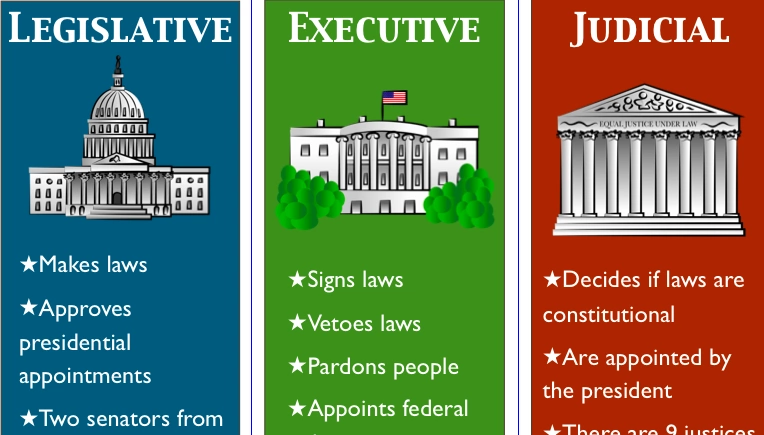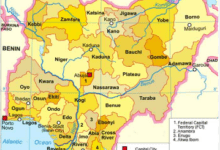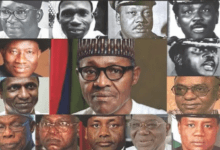In this article, we will be looking at the three arms of government in Nigeria, and their functions.
The Executive Arm of Government
The executive is that arm of government that implements laws.
👉 Relocate to Canada Today!
Live, Study and Work in Canada. No Payment is Required! Hurry Now click here to Apply >> Immigrate to CanadaFunctions:
1. Laws Enforcement
The executive enforces laws and also make sure that it maintains law and order in the state. Anytime there is a breach of the law, the executive has to plug the breach and also bring those offenders to book.
Read Also: 10 Problems Of Nigerian Leadership And Possible Solutions

2. Appointment-making
Every major appointment in Nigeria is made by the executive arm of government. Take, for example, it is the executive that appoints the Chief Justice as well as other Judges, who served in the Supreme Court and High Courts.
3. Treaty-making
The executive will decide which of the treaties are to be signed with the countries of its choice. They will negotiate treaties in line with every procedure, as defined by international law.
4. Defence, War and Peace
The executive will make sure that it defends and preserves the Nigerian unity and integrity in accordance with its duties.
Read Also: 10 Problems of Legislature in Nigeria and Possible Solutions
5. Foreign Policy-making
Given the global interdependence, it, therefore, becomes the functions of a government to make sure that, foreign policy of the state is formulated, and this is the executive functions.
6. Financial Function
Although, it is the legislature that controls all finances. It is in its power to impose, and reduce and/or eliminate a tax. Nevertheless, the executive also exercises some measure of financial functions.
👉 Relocate to Canada Today!
Live, Study and Work in Canada. No Payment is Required! Hurry Now click here to Apply >> Immigrate to Canada7. Grant of Titles and Honours
It is the function of the executive to grant titles and also honours to deserving Nigerians in recognition of their meritorious services to Nigeria as a nation.
The Legislative Arm of Government
The legislative arm of the government makes laws to the state.
Functions
1. Legislative or Law-making
The legislature legislates, that is it makes laws. Although ancient days, laws were made from customs, and traditions and even religious scriptures, but today, in this modern world, the legislature is the source where laws are derived from. It formulates the state’s will and gives it a legal character.
2. Deliberative Functions
Legislature deliberates upon matters that are of national interest and importance, and public issues, as other problems that the country may face. By this, the legislature will make sure it reflects the public opinion over different issues.
Read Also: The Role of Federal Government in Education in Nigeria
3. Finances Functions
It is the legislature that holds the country’s purse and controls its finances. Money cannot be spent by the executive without the legislature giving approval.
On a yearly basis, the executive will prepare a budget, and for the budget to be implemented, the legislature has to pass same into law.
4. Control over the Executive
It is the legislature that exercises control over the executive. For every one of its actions, and decisions, as well as policies, the executive is usually accountable for the legislature. It has the power to remove executive through a vote of no-confidence.
5. Constituent Functions
The legislature amends the constitution. Hence, it has to pass special laws, in line with the laid down procedure, as provided in the Constitution.
6. Electoral Functions
There are some electoral functions carried out by the legislature.
7. Judicial Functions
The legislature holds some judicial power. It can be assigned the duty of a court of impeachment, other words it can act as an investigating court for the purpose of trying public officials.
8. Ventilation of Grievances
The legislature can act as a forum for ventilation of public grievances against the executive, although it represents every interest, as well as every shade of opinion.
Read Also: 11 Functions of the Nigerian Judiciary
The Judicial Arm of Government
The judicial arm of government interprets laws.
Functions:
1. Gives Justice
Judiciary gives justice to the people, once they approach it. It also awards punishment to persons found guilty after trial. Aggrieved can approach courts for redress and compensation.
2, Interprets and Applies Laws
The judiciary interprets laws and applies laws especially to specific cases. While deciding disputes in the court, the judges will interpret, as well as, apply laws.
3. Role in Law-making
Judiciary plays a role when it comes to law-making. This is shown in the decisions made by the courts, which in essence, determine the meaning, and nature including the scope of the laws that are passed by the legislature.
4. Equity Legislation
When once any law is ambiguous, or it appears inconsistent with some laws of the land, the judges may decide to depend on their sense of justice, and fairness, and impartiality, and honesty or even on wisdom while deciding cases.
5. Protection of Rights
The judiciary safeguards the rights of citizens, that is why a citizen has the right of seeking protection from the judiciary at the event where his right is violated and threatened.
6. Guardian of the Constitution
The judiciary is the guardian of the Constitution. Since the Constitution is the supreme law, it is incumbent on the judiciary to interpret and also protect it.
7. Enforces Its Judgements
The judiciary has the power both to deliver judgements and decide disputes, as well as enforce same. Judiciary has the power to summon persons and also can direct the executive to perform its decision.
Read Also: E-Government in Nigeria: Potentials and Challenges
Conclusion
In this article, l have been able to discuss the three arms of government in Nigeria, and their functions, and I am hopeful that, this information will be of use to someone.




